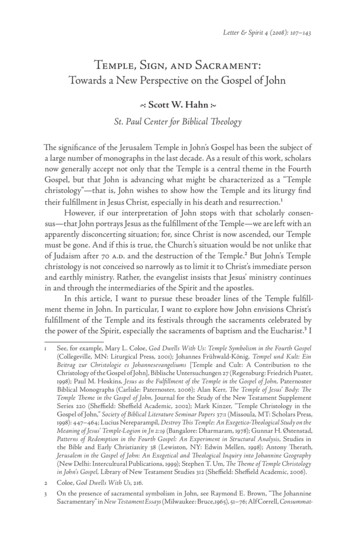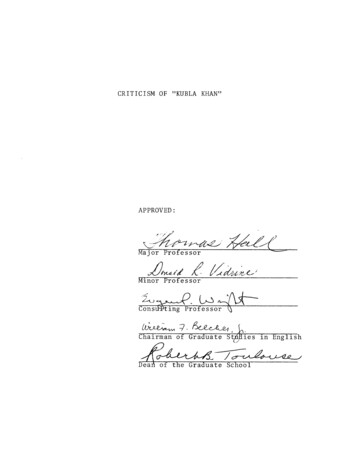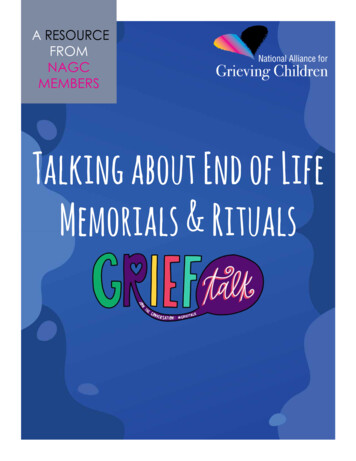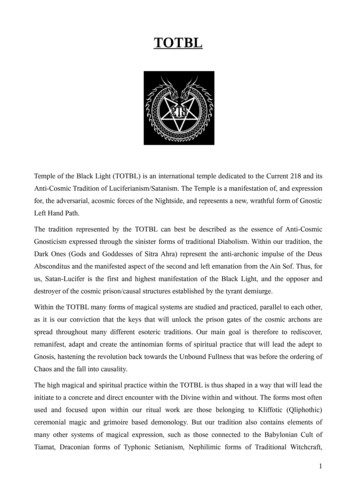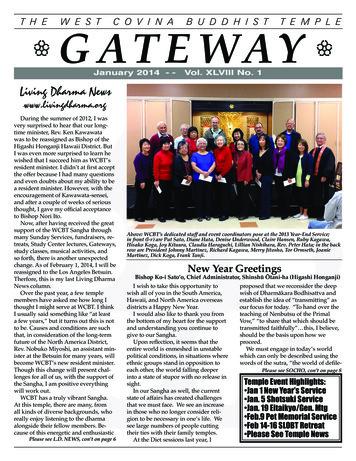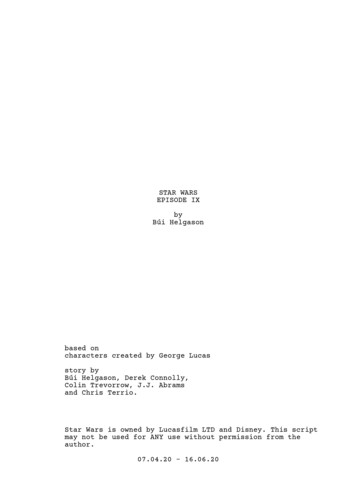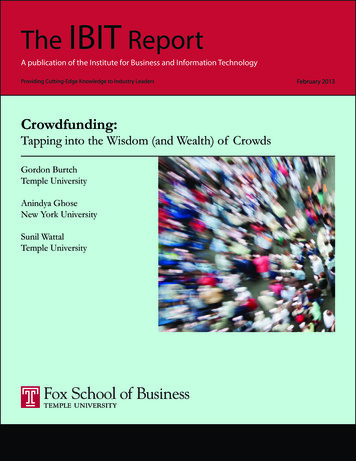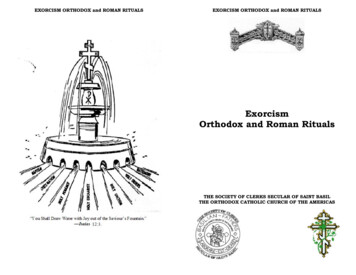
Transcription
Scriptura 114 (2015:1), pp. 1-18http://scriptura.journals.ac.zaPROPHETIC CRITICISM OF TEMPLE RITUALS:A REFLECTION ON MALACHI’S IDEA ABOUTYAHWEH AND ETHICS FOR FAITH COMMUNITIESBlessing Onoriode Boloje1Alphonso GroenewaldDepartment of Old Testament StudiesUniversity of PretoriaAbstractThis article presents some perspectives about Yahweh and ethics from Malachi’scriticism of the rituals of the temple. Malachi’s theological and ethical uniqueness isobserved somehow most clearly in the preponderance of negative emphasis theprophetic book places on temple rituals and the way the language of the cultdominates its analysis of malpractices. Prophetic criticism of temple rituals, as thisarticle demonstrates, lies at the heart of the controversy between the prophets andthe priest; namely the role of cult and ethics in the religion of Ancient Israel. Whilescholars have yet to explain fully the phenomenon of criticism of the cult inprophetic writings, this article brings the prophets and the priests closer byproposing that the one way to explain the discrepancy is to advocate that theseprophets could not see the importance of rituals for the improvement of ethical life.If the cult is understood to be the vertical dimension of the Law and ethics itshorizontal dimension, one would notice that these dimensions go together, both areexpressions of God’s will. When the vertical dimension (worship, offering, sacrifice)is experiencing some degree of dysfunction, the horizontal dimension (social justice,etc.) will be affected. Malachi’s emphasis on the temple obviously helps one to seethat there was nothing wrong with the cult unless it was not used appropriately andeffectively to enhance the ethical life of the people as an essential component of thelarger framework of the covenant relationship that Yahweh had with them as hispeople. The article thus emphasizes some underlying theological reflection on theuniqueness of Malachi’s oracles about Yahweh and ethics for faith communities.Key Words: Temple Rituals; Prophetic Criticism; Cult; Ethics; Malachi;Faith Community1Lecturer at the Baptist Theological Seminary, Eku, Nigeria and Postdoctoral Fellow, Department of OldTestament Studies, Faculty of Theology, University of Pretoria with Prof Alphonso Groenewald as researchleader. The article is based on research conducted by him for his doctoral thesis in the Department of OldTestament Studies (“Malachi’s view on temple rituals and its ethical implications”). His current researchproject at the University of Pretoria is an extension of the primary aims and objectives of his doctoral thesis.
http://scriptura.journals.ac.za2Boloje & GroenewaldIntroductionMalachi2 is considered to be one of the windows through which an adequate survey can beattained of the religious and social needs of Yahweh’s 3 people in Judah and Jerusalemduring the early fifth century BCE (Dempsey 2000:139). The book appears as the closingsection of the Hebrew Bible Book of the Twelve and the last Old Testament book in theEnglish Bible (Rendtorff 1993:57-65; Blenkinsopp 1996:209; O’Brien 2004:315; Coggins& Hans 2011:199-200; Watts 2000:209; LeCureux 2012:207,226). This has made a numberof scholars consider the book to be substantially a literary unit (Schart 2000:45; Fuller2012:372; Snyman 2012:2; LeCureux 2012:222). It conveys Yahweh’s word first toYehudites living in the Second Temple Period and beyond them to all believers in all times.It deals with issues of declining faith, disrespect or even contempt for Yahweh, emptyreligious rituals, self-seeking betrayal of marital vows and of the rights and needs of others,greed, injustice and materialism. Both priests and people had fallen away and need themessage of Malachi to call them back to repentance.Having returned to the land of their fathers after the tragedy that befell them and thedifficulties they experienced in the land of bondage, with hearts yearning for the fulfilmentof earlier prophetic visions of the establishment of Yahweh’s new kingdom, thereconstruction of the temple wherein Yahweh will once again make himself manifest tothem, and in addition, the assurance that they have been delivered from the shameful andreprehensible servitude of the adversaries of Yahweh – and thereafter, not to witness any ofthese anticipations – was no doubt devastating. The resultant implication was a watershedfor the faith of the Yehudites. The situation opened up a crisis of faith for them and alsoendangered the reputation of Yahweh. It cast misgivings and uncertainty on the reliabilityand authenticity of Yahweh’s words and promises as well as His capacity to sustain them(Block 2006:36; Bramer 2011:158-59). In an earlier article (Boloje & Groenewald2013:376-408), the misdemeanour of the priests and people in Malachi’s era werehighlighted. Malachi criticised the priests who had violated their covenant relationship withYahweh by despising his name and defying his altar. The book dealt extensively on thefunction and purpose of the priests and Levites:Priests were saddled with the responsibility of guarding the entire cultic life of thepeople. Thus, the principal way they despised and defiled Yahweh day after day wasthrough deficient and unacceptable offerings (1:6-2:3). On the other hand, the teachingaspect is considered to have been an integral part of the priestly office. Malachi accuses thepriests of causing many to falter by their pedagogical functions and or obligations toYahweh (2:8) and by implication, the people of Yahweh were led astray for lack of theknowledge of God. Their failure was indeed the ground for the humiliating judgement23In this article, reference to Malachi always implies the book. In some cases, reference is made to the ‘authors’of the book as well as its redactors, in the light of the final stage or form of the book of Malachi as part of theChristian canon. See Boloje's (2014:120f) thesis Chapter Three for details of authorship and date ofcomposition of the book of Malachi. Cf. also Jeremias (2013:93-117) who discusses the problem of ‘writtenprophecy’. He addresses inter alia questions regarding the intention behind the production of prophetic booksin the HB, the origin of written texts, the origin of prophetic books, the appearance of genuine writtenprophecy without any oral basis. These are all regarded as stages in the continuous growth in the authority ofprophetic books and messages.We will also make use of the name Yahweh in a similar manner as Barton (2014:vii) states: “After somethought, I have freely used the name ‘Yahweh’ for the God/god worshipped in ancient Israel I think itbetter to write the name straightforwardly in the form it is generally thought to have taken in the time beforeits pronunciation became taboo ”
http://scriptura.journals.ac.zaA Reflection on Malachi’s Idea about Yahweh and Ethics for Faith Communities3pronounced on them by Yahweh in the inspired words of Malachi 1:6-2:9 (Boloje &Groenewald 2013:376).The purpose of this article therefore is to present a highlight on the intricacies of theprophets’ criticism of the rituals of the temple as observed from both pre-exilic and postexilic prophetic writings. This article demonstrates that prophetic criticisms of templerituals, namely the role of cult and ethics in the religion of Ancient Israel,4 lay at the heartof the controversy between the prophets and the priests. It shall then conclude with someunderlying perspectives about Yahweh and ethics from Malachi’s criticism of the rituals ofthe temple for faith communities.Prophetic Criticism of the Rituals of the TempleThe following discussion focuses very briefly on the criticism of the rituals of the templefrom a literary and textual perspective. The aim is simply to demonstrate an understandingof the idea of the temple as expressed by the prophets/prophetic books. Such understandingis necessary in the light of the prophetic criticism of the rituals of the temple in the book ofMalachi. With respect to such criticism it is observed that from both pre-exilic and postexilic prophetic writings on this subject, the evidence leans toward two opposite directions(Barton 2007:111). Heaton (1977:64) notes that this debate is unlikely to reach an endbecause of the lack of substantial evidence. With the exclusion of Micah who speaks clearlyagainst offerings for sin and not to general religious ritual observances concerned withsacrifices following feasts and celebrations (Barton 2007:119), the prophetic writingsattributed to the pre-exilic prophets particularly of the eight and seventh centuries arepresented as being very critical and hostile of the cultic religious practices of the temple,especially the sacrificial services in it. On the other hand, some post-exilic propheticwritings record prophetic approval of the sacrificial cult, yet sometimes with condemnationof its existing forms (Barton 2007:111-112). In the following paragraphs, the article shallpresent a few observations from the biblical text and then reflect the views of scholars onthe prophetic criticism of rituals of the temple. The attempt here is to consider briefly whatcomprises the prophetic criticism. The texts that are cited frequently are those in which theprophets oppose the cultic and ritual practices of their contemporaries. They are treatedmostly as an indictment of established principles, an analysis of why these kinds of ritualact and specific cultic circumstances are dishonest. In their appeal to principles that areusually described as one’s ‘personal’ relationship with God or the ‘moral’ or ‘ethical’dimensions of religion, the prophets can be seen as casting doubts on the whole culticenterprise.4With regard to the choice of the term ‘Ancient Israel’ Barton (2014:4) remarks as follows: “I am concernedwith the Hebrew Bible or Old Testament not as the Scriptures of Judaism or Christianity, but as evidence forthe thinking of ancient Israelites and Jews Ancient Israel’s ‘moral philosophy’ will turn out to be highlytheological, though far less simply so than in the popular imagination”. He continues: “In calling this bookEthics in Ancient Israel, I am deliberately avoiding the more customary title for such works, The Ethics of theOld Testament In practice, however, the main source by far for ethical thinking in ancient Israel remains thetext of the Hebrew Bible/Old Testament, including the deuterocanonical/apocryphal books” (Barton 2014:14).
http://scriptura.journals.ac.za4Boloje & Groenewald5Amos for example, ridicules the sacrificial cult at Bethel and Gilgal by ironicallyasking the people to pile up their sacrifices: “Enter Bethel and transgress; in Gilgal multiplytransgression! Bring your sacrifices every morning, your tithes every three days. Offer athank offering also from that which is leavened, and proclaim freewill offerings, make themknown.” (4:4-5). Later on in another paradigmatic text, one sees him denouncing thefestivals: “I hate, I reject your festivals, nor do I delight in your solemn assemblies. Eventhough you offer up to me burnt offerings and your grain offerings, I will not accept them;and I will not even look at the peace offerings of your fatlings. Take away from me thenoise of your songs; I will not even listen to the sound of your harps” (5:21-23).6 An upshotof this cultic expression is found in Hosea, who criticises mainly what he considers to be ahighly Baalized cult (Barton 2007:111), “For I delight in loyalty rather than sacrifice, andin the knowledge of God rather than burnt offerings” (6:6). In Micah, the prophet opposedto sacrifice, presents a proposal for accommodation between Yahweh and Israel, the groupsthat were having discrepancies at the opening of the chapter. When tried, judgment isissued against Israel; they are condemned of injustice and ungratefulness towards Yahweh.The guilt of their crime is too clear to be denied, too great to be discharged, and thus, theyexpress their plea to be at peace with Yahweh: “With what shall I come to the LORD andbow myself before the God on high? Shall I come to Him with burnt offerings, withyearling calves? . . . Shall I present my first-born for my rebellious acts, the fruit of mybody for the sin of my soul? He has told you, O man, what is good; and what does theLORD require of you but to do justice, to love kindness, And to walk humbly with yourGod?” (6:6-8).Isaiah announces the same message of dislike of their festivals and sacrifices in his firstchapter (1:11-14), and in Jeremiah, the prophet’s message assumes a disapproving viewpoint with respect to the temple. He is recorded as being drastically opposed to someaspects of the sacrificial cult, maintaining that it did not form any part of Yahweh’s worship(Barton 2007:112). As noted by the author of the text, God asks derisively through theprophet, “For what purpose does frankincense come to me from Sheba, and the sweet canefrom a distant land? Your burnt offerings are not acceptable, and your sacrifices are notpleasing to me” (Jer. 6:20). He criticises all who hold wrong and distorted perspectivesabout the temple: “Do not trust in deceptive words, saying, ‘This is the temple of theLORD, the temple of the LORD, the temple of the LORD’” (Jer. 7:4), and calls theirattention to the fortune of Shiloh’s sanctuary (Jer. 7:12). However, the prophet’s attack isnot directed at the temple as an institution but at those with misleading perspectives and adeceitful cultic attitude (Ahn 2011:78).In his theological assessment of the cult as the place and activity of public worship,Brueggemann (1997:650) notes that the cult plays an essential role in the faith and life ofthe ancient Israelite community. Old Testament scholarship must therefore reckon with thefact that the community which creates testimonies about Yahweh is, in principle and in56According to Barton (2012:52) Amos was Israel’s first theologian: “As far as we know, no one before himhad subjected the religious beliefs and practices of people in Israel to critical scrutiny. His message wasdelivered in short, pithy sayings, but they were soon collected into larger complexes”.Cf. also in this regard Barton (2012:66-67): “Amos apparently disapproved of the sacrificial cult, but it isevident that the people he was speaking to took it for granted that sacrifice was pleasing to YHWH. Theimpression his prophecy leaves us with is that they did not think YHWH was interested in anything else Certainly, at the national level, the prosperity of the nation depended on continuing to enjoy the favour of thegods, and for that, the national institutions, primarily the temples and shrines, need to keep up a steady supplyof sacrifices. Here, Amos’s message was extremely radical”.
http://scriptura.journals.ac.zaA Reflection on Malachi’s Idea about Yahweh and Ethics for Faith Communities5practice, a worshipping community. He contends that in worship Israel deals with theperson, character, will, purpose and presence of Yahweh in a much regularised, stylisedway rather than by history as much modern Old Testament scholarship contends. Thetextual traditions about Israel’s worship are rich and varied. These texts seek to articulateand make accessible real presence. More importantly, the concrete practice of ‘rituals andsacraments’ fashioned Israel as a community intensely and definitely related to Yahweh. Herejects the general Christian conception of Old Testament theology derived from classicalProtestantism with its profound aversion to cult, regarding cultic actions as archaic, magicaland manipulative and thus finding value only in the Old Testament’s prophetic-ethicaltraditions (Brueggemann 1997:651).In the ritual criticism of the prophets, Brueggemann points out that the cult does becomea place of self-indulgence and satiation. He maintains that the prophets were concernedwith the gross abuses in the cult and would not have entertained the notion of abolishing thecult. The cult in these prophetic polemics should be a witness to and embodiment of thepractice of communion with Yahweh – in his true character as sovereign and merciful. Sohe concludes that beyond its instrumental use as a necessary support for ethical intentions,the cult provides a place in which Israel might be in the presence of Yahweh, the Holy One,and thus no evidence that the prophets opposed public worship itself, as long as thatworship focused on the peculiarity of Yahweh, the true God of Israel (Brueggemann1997:678). What is very special to Brueggemann’s assessment is his identification ofIsrael’s cult as a direct witness, or testimony about one who is behaving in an ethicalmanner.In his explanation on the pre-exilic prophets who are opposed to sacrifice, Barton(2007:119) notes that only Micah, speaks against the sin-offering in Mic. 6:6, “With whatshall I come to the LORD and bow myself before the God on high? Shall I come to Himwith burnt offerings, with yearling calves?”. The other pre-exilic prophets seem moreinterested in sacrifices following feasts and other celebrations:.overwhelmingly concerned with the kind of sacrifice which accompanies feasting,probably the selamîm type, offered with rejoicing and thanksgiving in mind . that couldmean that at least some of the anti-sacrifice polemic in, say Amos and Isaiah, is linked totheir disapproval of feasting and self-indulgence, rather than to questions of what for uswould be strictly questions of religious ritual observance (Barton 2007:119).As Barton proceeds, he addresses the argument of scholars who deny the sustainability ofthe rituals in ancient Israel and who promote the idea of religion which has at its heartrather right social interaction than mere observance of ritual stipulation (Barton 2007:116121). Barton, however, does not explain the post-exilic prophetic statements in favour ofthe cult, which are far more than the statements against the cult from pre-exilic prophets.While he also fails to address further the question of how far the prophets opposed thecultic rituals considered it improper for those who were engrossed in such activities whichto them were sinful, such as oppression of the poor and perversion of justice, he notes thatthe majority of prophetic criticism of the cult does appear to concern the offering ofsacrifices or the habit of fasting by those who have compromised themselves morally (as inthe case of Isa. 58). To him, “The way to please Yahweh, the prophets urge, or the way tobe forgiven for one’s sins, is to engage in moral reform. Until that is done, practicing culticobservances compounds the insult being offered to God” (Barton 2007:120).Ben Zvi (2006:19-30) notes that as one turns to books explicitly set in the Persianperiod, one finds again a case of prophetic diatribe against priests who failed to perform
http://scriptura.journals.ac.za6Boloje & Groenewaldtheir duties (Mal. 2:1-3), but even this book is certainly not anti-priestly. On the contrary itreaffirms the importance of proper priests and the centrality of the temple. This reveals thatthe existence of a central temple requires the presence of faithful priests (Ben Zvi 2006:23).Klawans (2006:75-100) presents an excellent analysis of discussions on the modern studyof prophetic criticism of the cult and concludes that the opposition of the prophets tosacrifice reflects the social and economic messages of the prophets themselves. In theprophetic criticism of cultic activities, Klawans advances that the prophets articulated theirhostility to sacrifices and offerings, even though they did not intend to repudiate thelegitimacy of cultic worship. He notes that the gifts presented for sacrifice by the peoplewere unacceptable on the grounds that the offerings themselves (the material gifts), hadbeen stolen. “Sacrificing a stolen animal is, at one and the same time, both ethically andritually wrong” (Klawans 2006:98). He bases his argument on some prophetic statementsconcerning sacrifices that are in line with expressions of concern over the economicmanipulation of the poor and needy, as seen in passages such as Amos 5:10-11 (cf. Amos5:23, or Isa. 1:11-15). That the priests could accept stolen material gifts (even if they didnot know it) for ritual purposes implies that they presumed rightful ownership on the part ofthose bringing the offerings (Klawans 2006:87-88). However, while Klawans does not offerreasons as to why the prophets of the eighth century would swiftly criticise temple ritualpractices as well as explain the impact that individual prophetic criticism of sacrifice had ontheir respective audience, his perspective of the problem of rejection of sacrifices is amatter of urgent priority.In his work, Zevit (2006:189-217) notes that the classical prophets of ancient Israelwere individuals concerned primarily with Israel’s ethical behaviour. Consequently, forthem, adherence to the ethical stipulation of the covenant was deemed more important thanthe punctilious fulfilment of cultic minutiae. If this is true, as the consensus maintains, it isclear that they must have given some thought to priests, promoters of that which they feltimpeded Israelites from fulfilling their ethical covenant obligations (Zevit 2006:189). Inthis vein, it is reasonable to infer that some prophets must have felt animus toward priests,and their hostility should be imprinted in the preserved literature (Zevit 2006:190). In herprophetic critique of the priority of the cult, Lafferty (2010:4) begins with a survey andcritique of the cult in ancient Israel and establishes the place and significance of the cultparticularly in pre-exilic Israel and Judah. Lafferty (2010:13) attempts to answer thequestion as to what role ethical language plays in light of the prophets’ rejection of ritualand then establishes that their background knowledge of wisdom ethics and of the cultenabled Amos and Isaiah to voice what Yahweh desires most of all as a matter of thepeople’s attitude. These prophets’ criticism of the cult does not judge the cultic actions, northe goodness of the sacrifices offered, or the piety with which the prayers are offered. As analternative, the prophets charge the people to perform suitable, viable, merciful and ethicalattitudes toward one another. It is such ethical behaviour that helps to establish whetherYahweh accepts the cult or declares it outrageous.Reflection on Malachi’s Oracles about Yahweh and Ethics forFaith CommunitiesAs a book dominated by the religious questions of appropriate temple worship and priestlymalpractices, Malachi no doubt carefully conducted his criticism of the rituals of the templeby directing attention to certain highly unacceptable and inexcusable misdemeanours,namely disrespect for Yahweh, worthless cultic rituals, unfaithfulness to marital vows that
http://scriptura.journals.ac.zaA Reflection on Malachi’s Idea about Yahweh and Ethics for Faith Communities7resulted in the malpractices of mixed marriages and divorce, and violation of the rights andneeds of others, greed, injustice, and materialism. In the light of the fact that the main focusof the priests is on cult and ritual activities (cf. Barton 2007:111; Hrobon 2010:6), theprophetic criticism of the rituals of the temple is considered to be a rhetorical characteristicthat compels attention to significance of their ethical conduct rather than mere refutation. Itis in this regard that theological and ethical dimensions of Malachi's criticism of the ritualsof the temple shall be considered. In this reflection, the biblical text is assumed to be theauthoritative word for the church,7 and thus the fitting context within which one can do anethical reading for the ecclesial community. 8 To this end, ethics cannot be simply anacademic activity that has to be isolated from the practical life of the church (Boloje &Groenewald 2014a:1). Since ethics and theology are indivisible in the Hebrew Bible or OldTestament (Wright 2006:17):.the best way for one to appreciate OT ethics, as well as to make an adequate application of same is for one to attempt to identify with Israel’s standpoint. Additionally, oneneeds to appreciate how they comprehended and lived out their affiliation with Yahweh,and how that perspective shaped their ethical standards as a community of faith andpractice (Boloje & Groenewald 2014b:2).As observed by Davies (1995:165) the Old Testament9 is not much of a resource for ethicsin that it usually resorts to invoking obedience to commands (where ethical living amountsto obedience to the prescriptions), whether they are from a deity, a prophet or a parent. Thisis so because its literature reflects a system of communal rather than individual ethics.Davies focuses attention on the Garden of Eden narrative in Genesis 3, in which thewoman’s choice is between two propositions: whether or not to obey the divine commandnot to eat the fruit of the tree of knowledge, to illuminate his point (Davies 1995:165-170).Although he calls into question whether the Bible can be normative for ethics in the light ofsuch obedience to the prescriptions, he admits that it does provide a basis for ethicalreflection (Davies 1995:165).In her attempt to grapple with the role of the Hebrew Bible in contemporary Christianethics, Arndt (2011:5) observes, “To remark that the Hebrew Bible is important forChristian ethics is both to state the obvious and to make a claim fraught with countlesscomplications.” While biblical scholarship and ethicists continue to grapple with how toarticulate and overcome the complexities of accounting for the Hebrew Bible in Christianmoral theology,10 this experience of reading and the concerns it creates must be accordedmore importance in moral theology, if the Hebrew Bible is to be claimed as significant, and78910In this article, the expressions ‘church’, ‘faith community’ ‘ecclesia community’, and ‘Christian community’are used alternatively to refer to the community of baptised believers in Christ through all ages, a companywhich is distinct from the world by virtue of its calling from and separation unto God (Eph. 1:22; 3:10,21;5:25-32) (see Boloje & Groenewald 2014a:1).It is important though to bear the following statement by Barton (2014:94) in mind: “I shall not argue thatethics in ancient Israel was never seen as deriving from divine commands But I shall try to present theevidence for an ethic based on a perception of moral order in the world, which, if it does derive from God,does so by way of God’s character as creator rather than as a result of this (potentially arbitrary) command”.Davies (1995:164) uses this term ‘Old Testament’ because the reception history which influences this readingis a Christian one. The Hebrew text underlying his discussion is, however, the Masoretic Text, i.e. the(Jewish) Tanakh.Arndt (2011:6-7) identifies a vast array of challenges and pitfalls facing contemporary Christian ethicists toinclude: the interdisciplinary hurdles of working with the Hebrew Bible itself, the challenges of relating to thissacred text in a pluralistic context and the problem of relating to an ancient and strange text as a twenty-firstcentury person. She notes that the complexity of the problems requires that Christian ethicists collaboratemore closely with biblical scholars and other critical disciplines (Arndt 2011:21).
http://scriptura.journals.ac.za8Boloje & Groenewaldat the same time authoritative for the ethical lives of those who hold it to be a sacred textand thus authoritative for present day Christian ethical scholarship (Arndt 2011:7). Whilestressing the significance of the Hebrew Bible as a crucial (re) source of Christian moraltheology, Arndt (2011:7) notes:While biblical reading certainly involves personal and communal engagement andinterpretative moments, exegetical work that takes advantage of the contributions ofbiblical scholars, modern and postmodern, can and should make an important contribution to the ethical appropriation of these texts. But beyond this, Christians as Christianshave a basic imperative to be attentive readers, re-readers, and re-tellers of the biblicalstory. The Christian ethicist must consider what it means to our moral lives to be thiskind of reader.In dealing with certain tendencies in contemporary ethical treatment the biblical texts,Arndt chooses the biblical account of the aborted sacrifice of Isaac by his father, Abraham(Gen. 22), and provides a particularly apt locus for contending with the challenges ofChristian ethical interpretation of the Hebrew Bible, and for addressing methodologicalconsideration (Arndt 2011:20). She demonstrates in her ethical reading of Genesis 22, howthe power of even the most alarming and sometimes unpleasant and embarrassing OldTestament narratives communicate and impart basic ethical lessons for a contemporaryChristian life. Her illustrative reading of this text helps to realise the significant andauthentic role biblical texts play in one's ethical scholarship and in his or her moral life asthe individual places himself or herself in relationship to such difficult, thought-provokingand imaginably, such indeterminable biblical texts.Similarly, in his attempt to make Christians read the Old Testament and find in it ethicalvalues, Sloane (2008:29) remarks that the best framework for understanding the OldTestament in Christian ethics is what Christopher Wright outlines in three key ‘angles’, ashe refers to them: God, Israel and the Land, or the theological, social and economic angles.Old Testament ethics is considered to be always theological and God-centred in nature. Inthis regard, ethics is viewed as a response to God’s grace, which stimulates, patterns andempowers the action of God’s people. In addition the ethics of the Old Testament isaddressed to Israel as a faith community and thus seeks to shape them as God’s people.Israel is called to be a model of God’s purpose to a watching world; they are “a ‘paradigm’of God’s purpose for human community as a whole” (Sloane 2008:3
dominates its analysis of malpractices. Prophetic criticism of temple rituals, as this article demonstrates, lies at the heart of the controversy between the prophets and the priest; namely the role of cult and ethics in the religion of Ancient Israel. While scholars have yet to explain fully the phenomenon of criticism of the cult in
